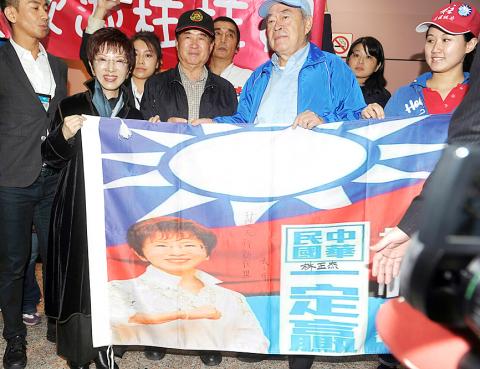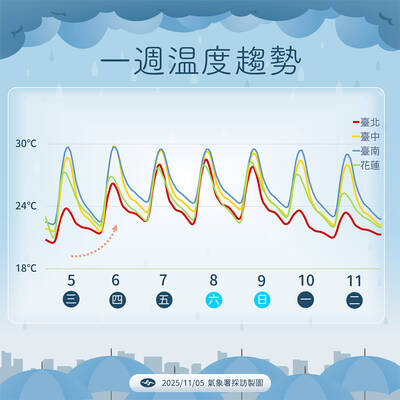The Chinese Nationalist Party (KMT) will continue to hold an annual cross-strait forum with the Chinese Communist Party (CCP) to maintain cross-strait peace and interactions, KMT Chairwoman Hung Hsiu-chu (洪秀柱) said yesterday after arriving in Taoyuan from a trip to China.
Hung landed at Taiwan Taoyuan International Airport at about 5pm, where supporters greeted her chanting “Sister Chu Chu [Hung’s nickname], I love you!”
“During my five-day visit, we were welcomed enthusiastically. Sincerity and goodwill were demonstrated by both sides at my meeting with the leader on the other side of the Taiwan Strait [Chinese President and CCP General Secretary Xi Jinping (習近平)]. The Taiwanese businesspeople and students I met also recognized our efforts and expressed hope that cross-strait exchanges be continued,” she said.

Photo: CNA
Eight cities and counties governed by the pan-blue camp or independents are to sponsor a tourism and cultural exhibition in China at the end of this year as a result of this week’s KMT-CCP forum in Beijing, Hung said.
The KMT would continue to push for things that are conducive to the welfare of Taiwanese, she added.
A delegation of six KMT and two independent local government leaders visited Beijing in September, where they offered their acceptance of the so-called “1992 consensus” in exchange for preferential tourism treatment by China.
Before leaving Beijing yesterday, Hung visited the Taiwan Hall in the Great Hall of the People, where she said that the current atmosphere across the Taiwan Strait prompted the KMT to attempt new breakthroughs.
“It is an unshakable responsibility that we will not pass on to others… However, the mountain top cannot be reached in a single leap,” Hung said, adding that moving cross-strait relations forward required step-by-step effort, continuous communication, exchanges and mutual empathy.
Hung said that she has gained a lot from her exchanges with Chinese officials during her trip, expressing confidence that these gains would be helpful to future interactions and peaceful and stable development across the Strait.
Hung and her delegation first visited Nanjing to pay tribute to Republic of China founder Sun Yat-sen (孫中山) at his mausoleum, before heading to Beijing.
She met with Xi on Tuesday and then attended the two-day Cross-Strait Peaceful Development Forum.
The KMT and CCP annual forums began in 2006, after former vice president and then-KMT chairman Lien Chan (連戰) visited China in April 2005.
The so-called “1992 consensus,” a term former Mainland Affairs Council chairman Su Chi (蘇起) admitted to making up in 2000, refers to a tacit understanding between the KMT and Beijing that both sides of the Strait acknowledge there is “one China,” with each side having its own interpretation of what “China” means.

Three Taiwanese airlines have prohibited passengers from packing Bluetooth earbuds and their charger cases in checked luggage. EVA Air and Uni Air said that Bluetooth earbuds and charger cases are categorized as portable electronic devices, which should be switched off if they are placed in checked luggage based on international aviation safety regulations. They must not be in standby or sleep mode. However, as charging would continue when earbuds are placed in the charger cases, which would contravene international aviation regulations, their cases must be carried as hand luggage, they said. Tigerair Taiwan said that earbud charger cases are equipped

Foreign travelers entering Taiwan on a short layover via Taiwan Taoyuan International Airport are receiving NT$600 gift vouchers from yesterday, the Tourism Administration said, adding that it hopes the incentive would boost tourism consumption at the airport. The program, which allows travelers holding non-Taiwan passports who enter the country during a layover of up to 24 hours to claim a voucher, aims to promote attractions at the airport, the agency said in a statement on Friday. To participate, travelers must sign up on the campaign Web site, the agency said. They can then present their passport and boarding pass for their connecting international

UNILATERAL MOVES: Officials have raised concerns that Beijing could try to exert economic control over Kinmen in a key development plan next year The Civil Aviation Administration (CAA) yesterday said that China has so far failed to provide any information about a new airport expected to open next year that is less than 10km from a Taiwanese airport, raising flight safety concerns. Xiamen Xiangan International Airport is only about 3km at its closest point from the islands in Kinmen County — the scene of on-off fighting during the Cold War — and construction work can be seen and heard clearly from the Taiwan side. In a written statement sent to Reuters, the CAA said that airports close to each other need detailed advanced

UNKNOWN TRAJECTORY: The storm could move in four possible directions, with the fourth option considered the most threatening to Taiwan, meteorologist Lin De-en said A soon-to-be-formed tropical storm east of the Philippines could begin affecting Taiwan on Wednesday next week, the Central Weather Administration (CWA) said yesterday. The storm, to be named Fung-wong (鳳凰), is forecast to approach Taiwan on Tuesday next week and could begin affecting the weather in Taiwan on Wednesday, CWA forecaster Huang En-hung (黃恩鴻) said, adding that its impact might be amplified by the combined effect with the northeast monsoon. As of 2pm yesterday, the system’s center was 2,800km southeast of Oluanbi (鵝鑾鼻). It was moving northwest at 18kph. Meteorologist Lin De-en (林得恩) on Facebook yesterday wrote that the would-be storm is surrounded by